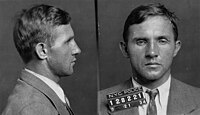Bruno Richard Hauptmann
| Richard Hauptmann | |
|---|---|
 |
|
| Born |
Bruno Richard Hauptmann November 26, 1899 Kamenz, Saxony, Germany |
| Died | April 3, 1936 (aged 36) Trenton, New Jersey |
| Occupation | Carpenter |
| Criminal penalty | Death by electrocution |
| Criminal status | Deceased |
| Spouse(s) | Anna Schoeffler |
| Children | Manfred Richard Hauptmann |
| Conviction(s) | Murder-kidnapping of Charles Lindbergh, Jr. |
Bruno Richard Hauptmann (November 26, 1899 – April 3, 1936) was a German-born carpenter who was convicted of the abduction and murder of the 20-month-old son of aviator Charles Lindbergh and his wife Anne Morrow Lindbergh. The Lindbergh kidnapping became known as "The Crime of the Century". Hauptmann proclaimed his innocence to the end, but was nonetheless executed in the electric chair at the New Jersey State Prison in 1936.
Hauptmann was born Bruno Richard Hauptmann in Kamenz, near Dresden in what was then the German Empire, the youngest of five children. Neither he nor his family and friends used the name "Bruno," although prosecutors in the Lindbergh kidnapping trial referred to him by that name. He had three brothers and a sister. At age 11, he joined the Boy Scouts (Pfadfinderbund). Hauptmann attended public school (Realschule), but quit at the age of 14. He then worked during the day while attending trade school (Gewerbeschule) at night, studying carpentry for the first year, then switching to machine building (Maschinenschlosser) for the next two years.
Hauptmann's father died in 1917. During that same year, Hauptmann learned that his brother Herman had been killed fighting in France in World War I. Not long after that, he was informed that his brother Max was now dead too, having fallen in Russia. Shortly thereafter, Hauptmann was conscripted and assigned to the artillery.
Upon receiving his orders, he was sent to Bautzen, but was transferred to the 103rd Infantry Replacement Regiment upon his arrival. In 1918, Hauptmann was assigned to the 12th Machine Gun Company at Königsbrück. Hauptmann later claimed he was deployed to Western France with the 177th Regiment of Machine Gunners in either August or September 1918 then fought in the Battle of Saint-Mihiel; that he was gassed in September or October 1918; and that he was struck in the helmet by shrapnel from shelling, knocking him out so that he was left for dead. When he came to, he crawled back to safety and was back to the machine guns that evening. After the war, Hauptmann and a friend robbed two women wheeling baby carriages they were using to transport food on the road between Wiesa and Nebelschütz. The friend wielded Hauptmann's army pistol during the commission of this crime. Hauptmann's other charges include burgling a mayor's house (using a ladder). Released after three years in prison, he was arrested three months later on suspicion of further burglaries.
...
Wikipedia
